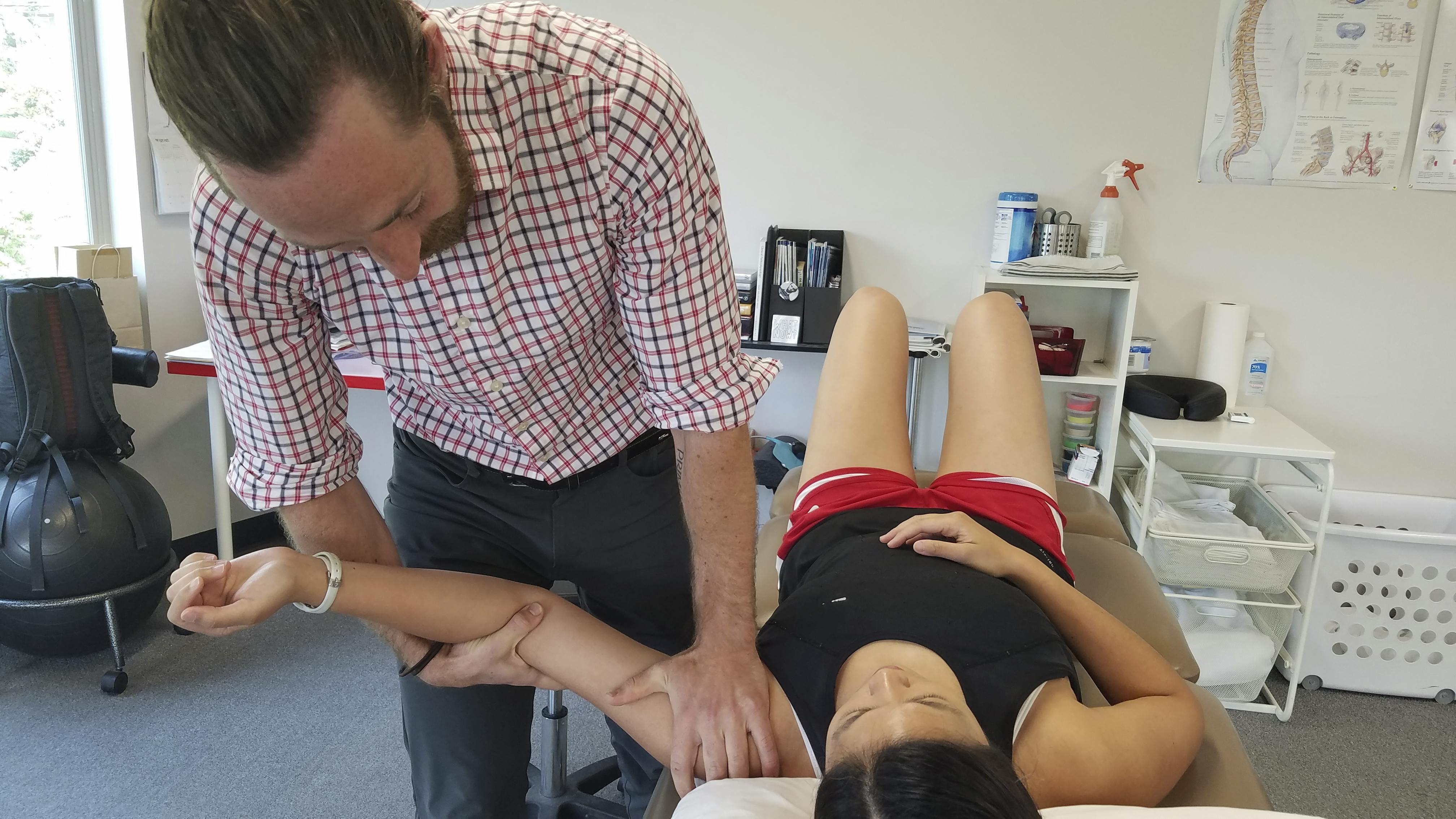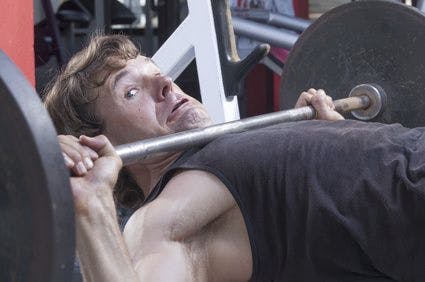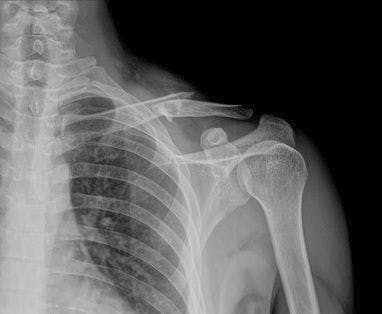Shoulder Pain Relief In Hillsboro & Beaverton
If you are looking for shoulder pain relief in Hillsboro or Beaverton, the information below will help you make a better decision as well as help you avoid unnecessary and expensive healthcare treatment.
Roughly one in every three people will have to deal with a shoulder injury at some point in their life. What's worse, half of those people will continue to report having shoulder pain three years later.
Most common shoulder injuries:
- Compression of the structures under the acromion
- rotator cuff muscles
- subacromial bursa
- biceps tendon
- Can contribute to rotator cuff tears
So what does your shoulder consist of?
- Glenohumeral joint (ball and socket)
- Scapulothoracic joint (shoulder blade on rib cage)
- Acromioclavicular joint (collar bone and shoulder blade)

What can shoulder therapy do for your pain?
The soft tissues around the shoulder joint (muscles, tendons, ligaments, joint capsule) must be elastic enough to allow the desired movement. Things like manual therapy and specific stretches can help to regain this crucial aspect of shoulder function.
In order for the ball and socket to smoothly execute the rolling and gliding necessary to lift your arm overhead, you need to be able to keep certain parts stable so other parts can move. This stability mostly comes down to strengthening of the rotator cuff.
The importance of motor control and positioning is paramount with shoulder movements.
Our West Portland physical therapy clinics can help you with your shoulder injury treatment with our state of the art equipment and experienced therapists.
Click the headings below for more information:
Chest Injury Treatment

Chest strains are very common with weightlifters and patients who perform sports activities. Though considered a mild injury, if not treated chest injuries can manifest into poor posture and cause secondary shoulder issues like subacromial impingement of the rotator cuff.
Chest injury therapy treatments involve manual therapy and stretching to decrease muscle tension and fiber adhesions, while gradually progressing strengthening. Because chest strains tend to happen with athletic populations, activity modification is necessary so the athlete does not re-injure the muscle by returning to intense physical activity too fast too soon. Particular attention to shoulder mechanics and proper scapular mechanics is necessary during and after chest injuries to make sure the athlete is able to reach maximum power in all ranges of shoulder motion.
Rotator Cuff Tear Therapy
Rotator cuff tears can affect all age spans of the population. Rotator cuff tears usually come about from chronically bad posture and poor scapular mechanics that cause extra friction to rotator cuff muscles and tendons. In fact, scapulo-humeral mechanics is the mainstay of effective long-term rotator cuff therapy for the shoulder and is the focus of majority of PT sessions.

Whether a rotator cuff has been operated on or not, gradual and progressive strengthening of the rotator cuff complex, along with strengthening the periscapular muscles is highly important in achieving full rehabilitation of the shoulder. Initial phases of rotator cuff physical therapy include pain modulation, passive and active range of motion techniques to maintain and gain shoulder movement. Later phases include strengthening of the shoulder girdle muscles located in the upper back: especially the lower and middle trapezius muscles, and the serratus anterior muscles that lie on the ribcage. Progressive exercises then graduate on to return to daily living activities and athletic activities like lifting, carrying and throwing maneuvers.
Clavicle Fracture Treatment

Clavicle, or collarbone, fractures happen from traumatic accidents in sports or in a car injury. Clavicle fractures can range in mild to severe, and must be followed by a physician and routine X-Rays to make sure that union of the bone is healthy and strong. Then the ongoing clavicle injury therapy will continue to reduce pain and heal the injury.
A physical therapist can not only help with the pain of a clavicle fracture via soft tissue work, activity modifications and passive maneuvers for range of motion, but he/she can also gradually progress the patient in exercises that can allow return to normal strength and function.
What You Need to Know About Shoulder Pain – Don’t Insist on an MRI
Before you go down the path of expensive imaging studies like MRI and CT scans, you should know that these types of tests often produce false positives.
What this means is the test might indicate that something is wrong in your shoulder but it a. isn’t the source of your pain or b. doesn’t require immediate surgery.
To illustrate this point, consider the conclusion of this study and this article published in the NY Times:
Magnetic resonance imaging identified a high prevalence of tears of the rotator cuff in asymptomatic individuals. These tears were increasingly frequent with advancing age and were compatible with normal, painless, functional activity. The results of the present study emphasize the potential hazards of the use of magnetic resonance imaging scans alone as a basis for the determination of operative intervention in the absence of associated clinical findings.
Reference: https://www.ncbi.nlm.nih.gov/pubmed/7822341
The pitchers were not injured and had no pain. But the M.R.I.’s found abnormal shoulder cartilage in 90 percent of them and abnormal rotator cuff tendons in 87 percent. “If you want an excuse to operate on a pitcher’s throwing shoulder, just get an M.R.I.,” Dr. Andrews says.
Reference: https://www.nytimes.com/2011/10/29/health/mris-often-overused-often-mislead-doctors-warn.html
What to Do First – See One of Our Shoulder Treatment Experts in Beaverton and Hillsboro
If you are experiencing shoulder pain, you shouldn’t try to self-diagnose the problem. Our specialists can help you with this.
In almost all of the patients we see, natural, hands-on physical therapy is the treatment that you should try first. The advantages of seeing one of our physical therapy experts are as follows:
- No waiting - In most cases, you can see us right away,
- No side effects – In most cases, the treatment we provide has little to no side effects and can make you feel much better,
- It’s more affordable – an average course of treatment cost much less than tests, injections, or surgery,
- Seeing one of our physical therapists right away means we can quickly alleviate the pain and help you avoid additional doctor visits,
- Seeing one of our physical therapists first means you are less likely to need addictive opioid drugs
How Our Shoulder Specialists will Care for You
We want to make sure that we are providing you with the appropriate treatment. As such, here are the steps that new patients go through:
- An in-depth initial evaluation where we ask you about your pain, medical history, and current condition.
- A detailed physical exam looking at movement, strength, flexibility, soft tissues and nerves of the neck, shoulder blade, shoulder joints, and arm.
- A personalized plan of care to meet your goals.
- Patient education – details of what we’ve found during the exam and how we will help you address these limitations.
- Manual Therapy – hands-on techniques for pain relief and to restore mobility.
- Neuromuscular Reeducation to address restrictions, weakness, and range of motion
- A Home Program – we teach you what you can do to optimize healing at home as well.
- Modalities – specific treatments to address your pain if needed.
See One of Our Experience Shoulder Professionals Right Away
Physical therapist directed care is proven to be an effective treatment approach for the shoulder conditions described above. For more information, visit our contact page. We look forward to helping you.
Same-day/Next-Day Appointments are Available.
Our physical therapists at Stride Strong Physical Therapy can help patients recover from a myriad of shoulder injuries. In fact, some of our physical therapists were NCAA softball players and boxers who they themselves have suffered through their own bouts of shoulder pain and dysfunction. Being confidently coached by a PT who has walked the same path patients have to go through gives our patients a sense of security. If you have shoulder pain, call us today at and let us guide you through it at any of our of our convenient locations in Beaverton and Hillsboro.
